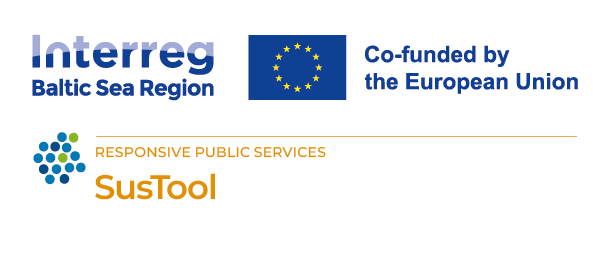Ülemiste City: Building a Sustainable Community From the Ground Up
Since 2024, Zero Waste Estonia has proudly called Ülemiste City its home – a decision that continues to align perfectly with the district’s visionary approach to sustainability, innovation, and community-led development. With its commitment to becoming a carbon-neutral, talent-driven smart city, Ülemiste City has not only talked the talk but is actively walking it.
Photo: Marek Metslaid, Ülemiste City
From transitioning to environmentally friendly district heating and cooling systems to building LEED-certified infrastructure and promoting a car-free core by 2030, Ülemiste has established itself as a model of modern, sustainable urban planning in the Baltics.
One of the cornerstones of Ülemiste City’s green transformation is the Green City Service – a digital platform offering real-time, personalized environmental data to tenants and businesses. It enables companies to monitor their resource consumption, emissions, and mobility impact, fostering smarter and more transparent decision-making across the board.
As advocates of circular economy principles, Zero Waste Estonia is especially encouraged by the district’s forward-thinking initiatives:
Data-driven waste management with public and company-level access
Mobility tracking and goals to reduce car usage
The role of Ülemiste City as a live laboratory for testing environmental innovations
Collaboration with academia and tech partners to shape future urban sustainability models
The synergy between data, environment, and innovation is more than evident here – it’s embedded in the DNA of Ülemiste’s green transition.
“For a zero-waste future, we need more than policy – we need action. Ülemiste City is proving it’s possible to design cities that work for people and the planet,” says Marianne Sepp from Zero Waste Estonia.
“We’re thrilled to see the values of resource efficiency, low-impact mobility, and community empowerment reflected so clearly in our new home base. And as Ülemiste City sets its sights on becoming a global benchmark for future-ready urban development, we are excited to be part of the journey.”
Interview with Mati Freiberg, Head of Sustainability at Ülemiste City
Ülemiste City is aiming for a carbon-neutral footprint. What have been the biggest challenges – and breakthroughs – in achieving this so far?
Mati Freiberg, Ülemiste City
Our focus has been on achieving a carbon-neutral footprint in the energy use of our office buildings. Significant progress has already been made through strategic policy and planning decisions. In the autumn of 2020, we transitioned to using 100% green electricity across all office buildings. The following year, in 2021, we implemented a central district heating and cooling network.
One of the ongoing challenges is replacing existing local heating systems and connecting them to this central network. This process is technically complex and requires substantial financial investment, making it difficult to carry out all at once. However, through careful annual planning, we assess which buildings can either be renovated or connected to the network each year. This step-by-step approach allows us to move steadily toward our carbon-neutral goal
What role do tenants play in shaping Ülemiste’s green roadmap – are you seeing increasing engagement from businesses?
Tenants play an essential role in shaping Ülemiste City’s green roadmap, and we’re seeing a clear increase in engagement from businesses. Many actively support and even request sustainable initiatives that align with their values and goals.
For example, sustainable mobility is a key focus—programs like Bike2Work are gaining popularity. On the data side, services like Green City provide real-time insights into resource use, helping companies make more informed and sustainable decisions.
We’re also seeing strong interest in the Test City concept, where companies and community members test new green technologies and services on campus. This collaborative approach not only supports innovation but helps drive meaningful progress toward our shared sustainability goals.
Can you share any exciting pilot projects or innovations currently being tested in Ülemiste’s “living lab” environment?
We are planning and seeking funding for larger-scale mobility-related projects—ranging from data-driven mobility pattern analysis to last-mile logistics. Our goal isn’t just to run isolated tests but to develop sustainable business and service models that align with Ülemiste City’s long-term concept. A lot of effort goes into in-house development and program-based projects, often in collaboration with universities, students, and partner companies.
Ülemiste City is actively piloting several forward-looking initiatives through its Test City platform. Although many ongoing and planned tests are still in early stages, some highlights from previous pilots include:
Service robots (like TEMI) tested in real office environments to support interaction and services.
AI-based energy optimization in buildings using R8 Technologies and Kone elevators data to reduce energy use and emissions.
Grab2Go smart store pilot, offering a seamless, cashier-free shopping experience using sensor and vision technologies.
Zero Waste Estonia is part of SusTool (Sustainability reporting tool) project (2023-2025) which is co-financed by Interreg Baltic Sea Region programme 2021-2027, 1 Priority Innovative societies, 1.2 Objective Responsive Public services and it contributes to EUSBSR PA Innovation Action.
Project partners include the Ministry of Economic Affairs and Communications as the lead partner from Estonia, and as partners: the Ministry of Finance and ITL from Estonia; VARAM and LIKTA from Latvia; DIMECC LTD from Finland, INFOBALT from Lithuania. The project will conclude on December 31, 2025.



